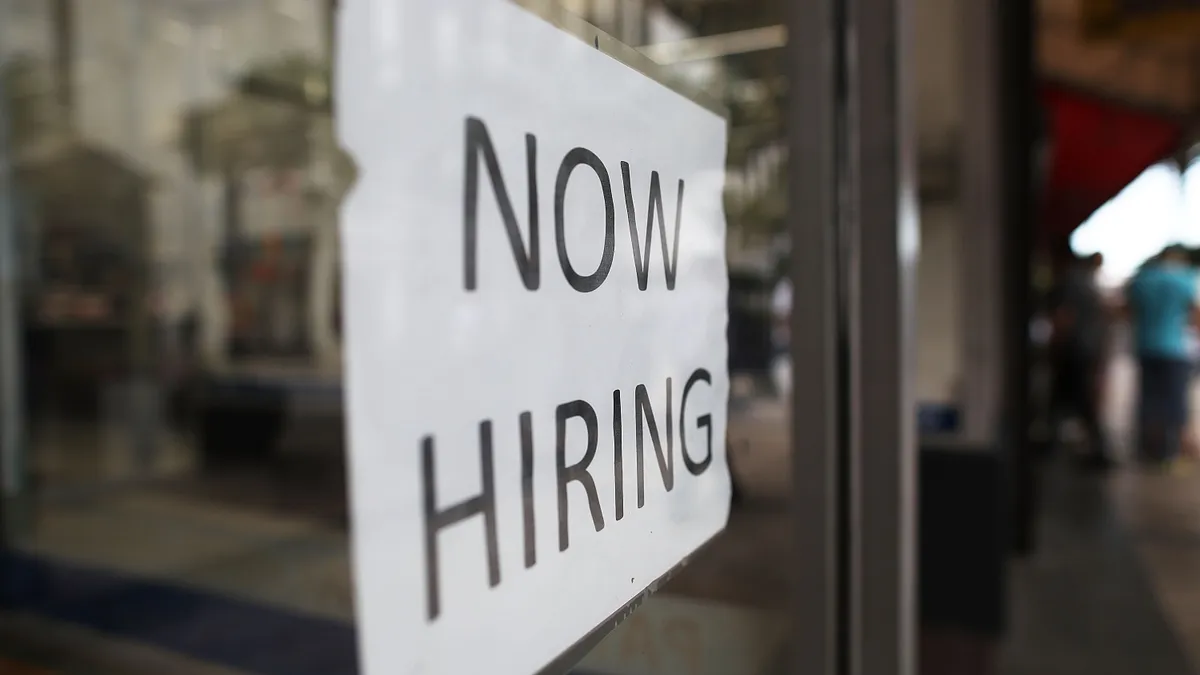Dive Brief:
- A new report from One Fair Wage finds that 57% of service workers are not returning to restaurant jobs in states that have prematurely ended federally funded unemployment insurance benefits. Half of the states in the U.S. made this move, or will soon, in a bid to incentivize workers to fill record-high openings, per the report.
- Sixty-nine percent of survey respondents said a livable wage could make them consider returning, followed by paid sick days (63%), health benefits (63%) and reduced workplace harassment (56%).
- The report suggests the $300 weekly unemployment benefits first put into place last year as part of a COVID-19 relief package isn't the main cause of the labor crisis. Only 16% of workers in five states that have already ended the additional benefits said they would return to their restaurant job or any low-wage role once their benefits were reduced, and 54% of workers who lost unemployment insurance said receiving benefits strengthened their interest in a livable wage.
Dive Insight:
Data from the U.S. Bureau of Labor Statistics shows that the 25 states planning to cancel benefits early have recovered about 80% of the jobs lost during the past year and a half, compared to a 66% recovery rate for the rest of the country. However, about 2.4 million more people in those 25 states are unemployed or no longer looking for work, hinting a slow hiring cycle could continue for the near term.
This labor issue is especially compounded in the restaurant industry, which has long struggled with high turnover but is facing additional challenges in light of the COVID-19 crisis. The One Fair Wage report shows that most (54%) workers now cite concerns about COVID-19 safety as one of their main reasons for leaving the industry.
Workers also state they have endured increased harassment for enforcing safety protocols, on top of the existing sexual harassment issues that have long plagued the industry. Further, according to report, nearly 60% of tipped workers said they have had difficulty accessing unemployment due to their low wages. The federal minimum wage for tipped workers remains $2.13.
In light of this growing list of concerns, the quit rate in the hotel and restaurant industry is currently the highest of any sector at 5.6%.
As such, employee shortages are the second top concern for restaurant operators after rising food costs, according to a June report from Quadrant Strategies. In response, several chains have committed to eventually offering $15-an-hour wages, including McDonald's for its company-owned restaurants, Starbucks and Chipotle. Chains are also starting to roll out more benefits, like child care and sick leave.
The tipped minimum wage remains an open-ended debate, with little industry movement outside of Olive Garden's commitment to raise wages to $10 including tipped income. Well-capitalized and larger-scaled chains are better able to absorb such labor pressures and pass some costs to consumers. Chipotle CFO Jack Hartung has even said the chain is well positioned to take a pricing increase.
For independents, however, it may not be as easy to recruit and retain employees in this environment. The One Fair Wage report indicates that independent restaurants have transitioned to new wage structures that provide workers a full wage with tips. It also notes that some operators are calling on policymakers to raise the federal minimum wage and end the subminimum wage for tipped workers, which could better level the playing field for independents.
"Without this permanent wage change, workers will not return and the restaurant industry will never fully reopen and recover," the report states.














